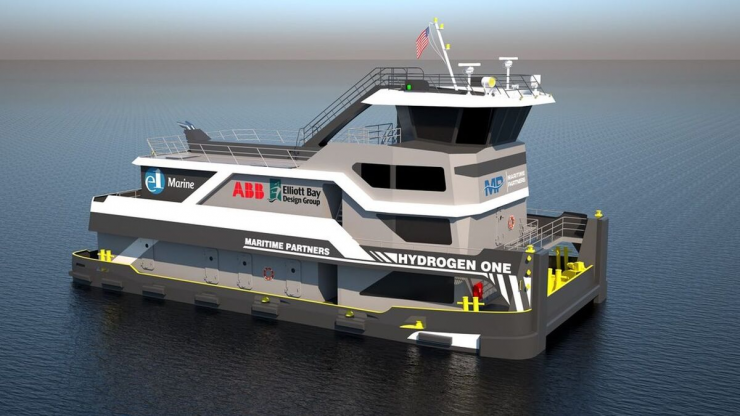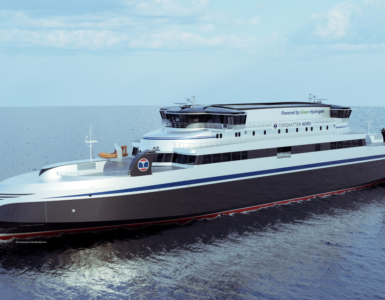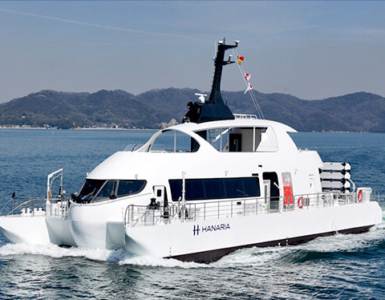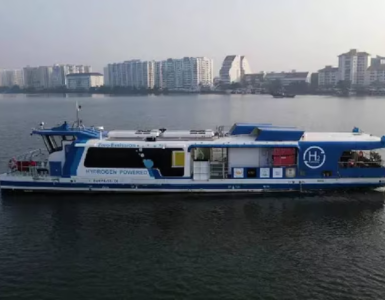Consortium starts work on world’s first hydrogen fuel cell inland tugboat.
[Riviera] A consortium of companies is designing the world’s first hydrogen fuel cell and battery-powered inland tugboat in the USMaritime Partners has signed a memorandum of understanding with ABB, Elliott Bay Design Group (EBDG) and e1 Marine to develop a methanol- and battery-powered push boat for inland operations in the US.
This ground-breaking project will lead to the construction of 27-m vessel Hydrogen One, which will be designed to push barges along inland waterways with almost zero emissions.
🔥 What about we co-host a webinar? Let's educate, captivate, and convert the hydrogen economy!
Hydrogen Central is the global go-to online magazine for the hydrogen economy, we can help you host impactful webinars that become a global reference on your topic and are an evergreen source of leads. Click here to request more details
The partners intend to install methanol storage, hydrogen fuel cells and battery energy storage on this vessel, enabling it to travel for four days without refuelling.
Maritime Partners will own and operate the EBDG-designed vessel along the Mississippi River and its many tributaries, a vast 23,000-km waterway network that extends from the Port of New Orleans, Louisiana.
Austin Sperry, Maritime Partners chief operating officer:
As a leading provider, lessor and financier of tugboats, tank barges and other workboats, we see this ground-breaking project as a major opportunity to advance sustainability in workboat operations in the US and beyond.
“For fuel cell deployment along one of the most extensive inland waterway networks in the world, commitment from a partner overseeing 550 tugboats is an excellent place to start.”
Hydrogen One will be an ultra-low emissions, long-range tugboat, with systems to convert methanol to hydrogen directly on board.
A generator supplied by e1 Marine will convert a mixture of methanol and water into fuel-cell grade high-purity hydrogen. Hydrogen generated by this process will be fed into the fuel cells to generate electricity.
ABB Marine & Ports will provide the full electrical propulsion plant including power and energy management, automation and integration of fuel cell and battery power.
Maritime Partners expects Hydrogen One to travel with a load for around 885 km at an average speed of 9 km per hour on a full tank of methanol before refuelling.
The complete propulsion package will generate 2,010 kW of power – 1,270 kW from the fuel cells and the rest from the onboard batteries.
Onboard hydrogen production from methanol will eliminate complexities typically associated with direct fuelling and storing hydrogen.
This approach results in no particulate matter emissions and less than 80% CO2 emissions compared with an electrolyser solution using electrical power derived from fossil fuel sources. If methanol comes from a renewable energy source, the energy chain can be carbon-neutral.
Methanol is currently available as a bunker fuel at many terminals and is easy to handle and store. It can be transferred to the vessel through bunkering and does not need to be stored under pressure.
With an electric system, fuel cells and batteries can provide sufficient power for all inland tugboat operations.
Hydrogen One will be operated by New Orleans-based Maritime Partners, which owns almost 550 tugboats, barges and other maritime assets.
ABB will provide the full electrical propulsion plant for Hydrogen One, including electric motors, transformers, and integrate the fuel cells and batteries.
ABB’s Onboard DC Grid power distribution system will ensure the fuel cell and battery output is delivered to the vessel’s subsystems in the most optimal way.
The overall power setup will be controlled by ABB’s PEMS power and energy management system, which will also increase fault tolerance and provide a high degree of reliability while ensuring the maximum lifetime for the batteries.
Fuel cells turn the chemical energy from hydrogen into electricity through an electrochemical reaction.
ABB Marine & Ports senior account manager for commercial vessels David Lee:
We can make a real difference to efficiency and sustainability in the workboat sector, and have a transformative impact on air quality given that these vessels often operate close to centres of population
“With this technology, we can offer US shipyards, as well as state and federal agencies, significant support on their journey towards more sustainable operations.”
EBDG is a leading firm of naval architects and marine engineers and e1 Marine is specialised in hydrogen generation.
Consortium Starts Work On World’s First Hydrogen Fuel Cell Inland Tugboat, December 2, 2021








